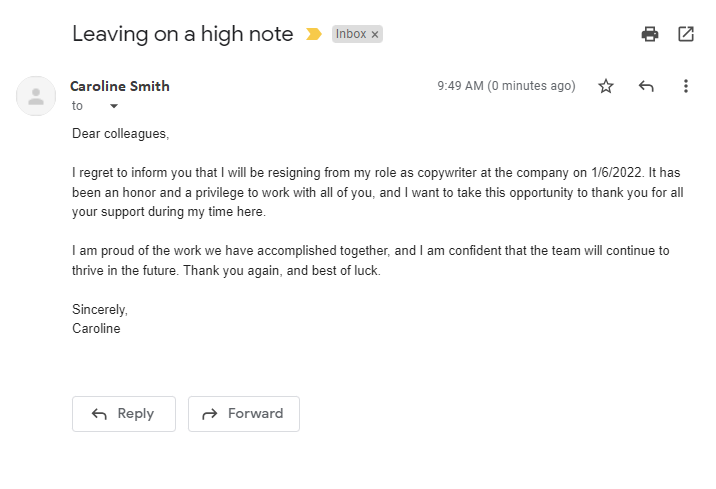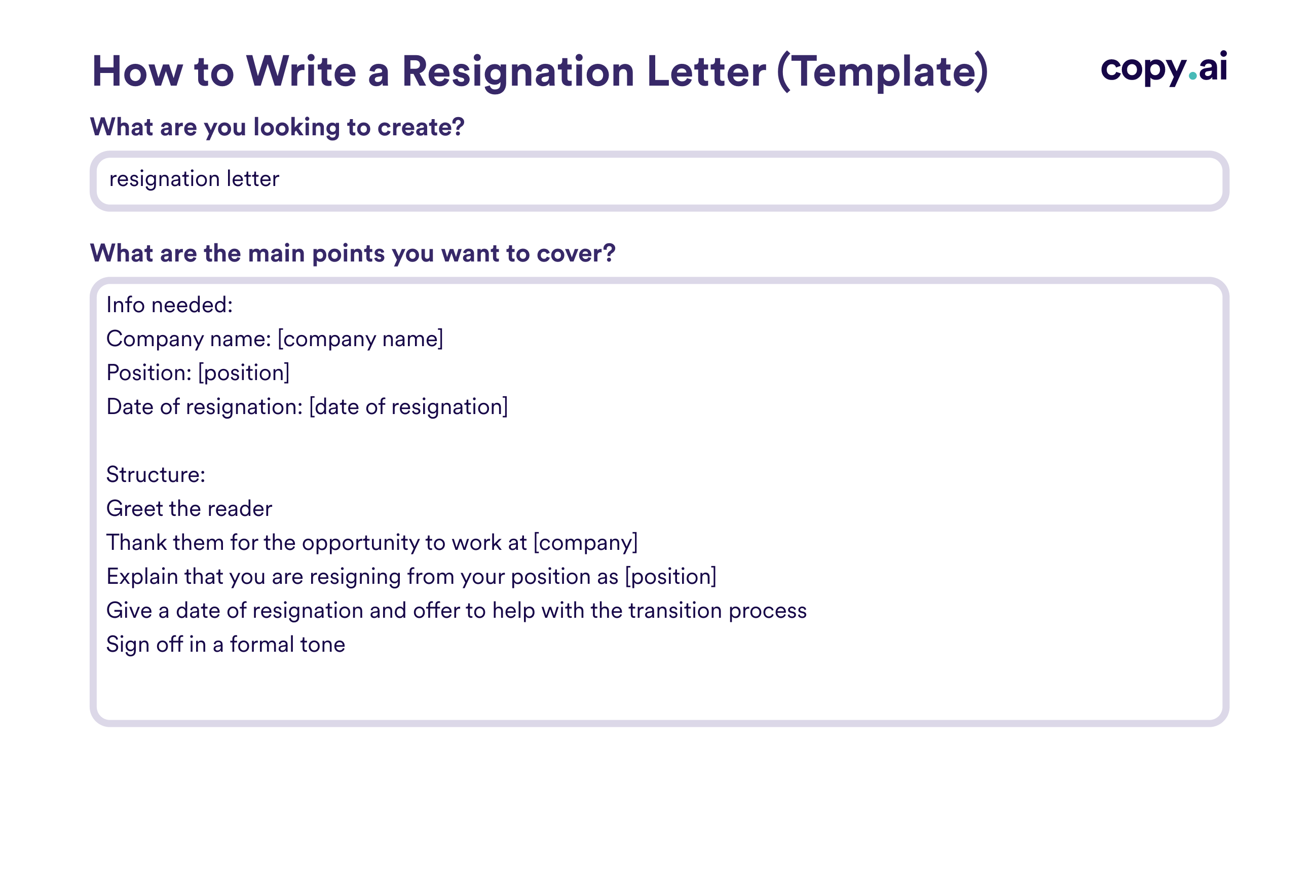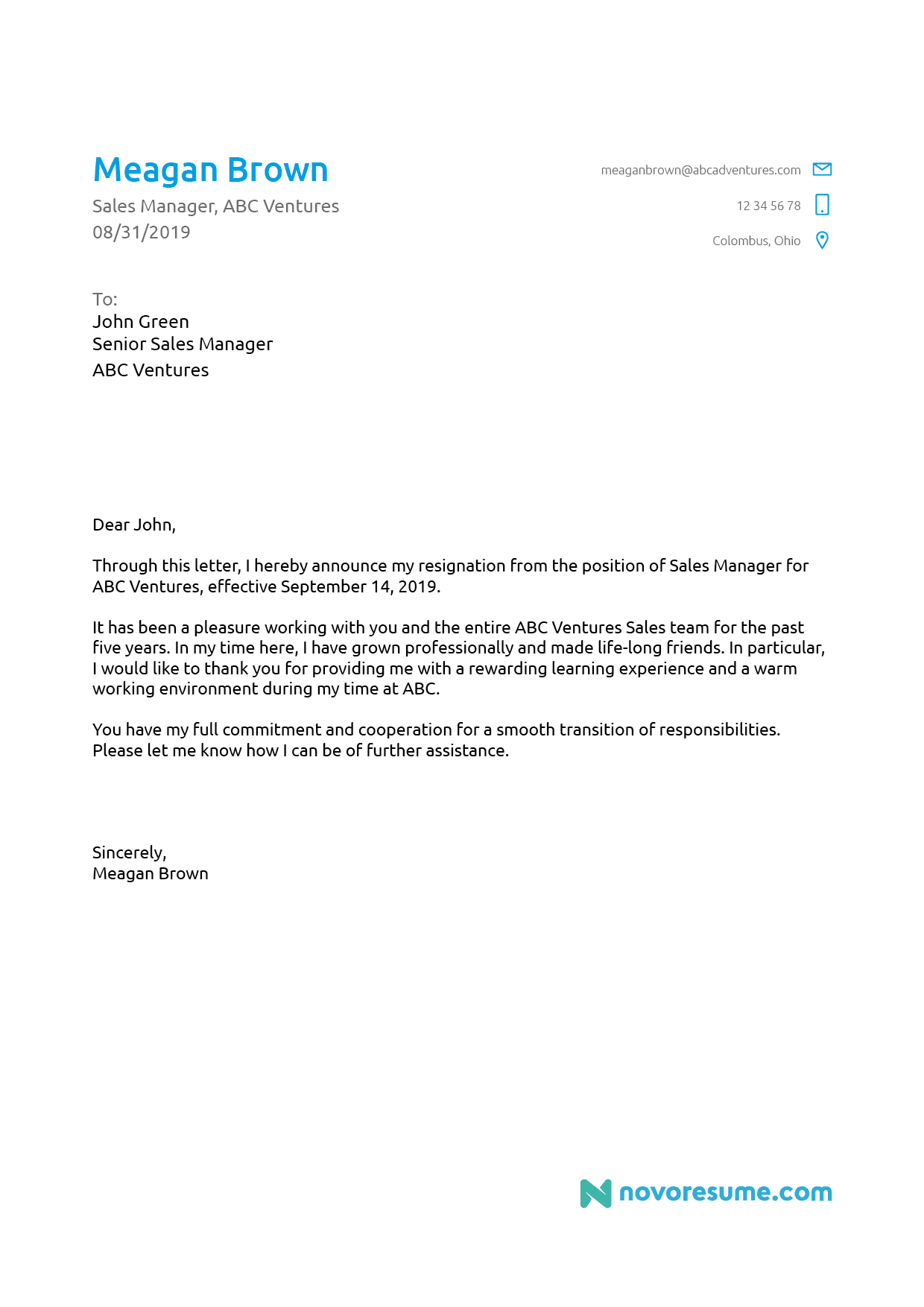Yes, you can email a resignation letter. But is it the best choice?
Deciding to leave a job can be stressful. How you resign is important. Emailing a resignation letter seems easy and quick. But there are factors to consider. Will it be seen as unprofessional? Does your company prefer face-to-face notice? Is there a right or wrong way?
In this blog, we explore the pros and cons of emailing your resignation. We will help you decide the best approach for your situation. Whether you are leaving for a new job or other reasons, understanding the right way to resign can make the process smoother and leave a positive impression. Let’s dive in.

Credit: www.liveagent.com
Email Vs. Traditional Resignation Letter
Deciding between emailing a resignation letter and handing in a traditional paper one can be tricky. While both methods have their pros and cons, the choice often depends on your workplace environment and your relationship with your employer. Let’s break down the benefits and drawbacks of sending an email resignation letter.
Pros Of Email Resignation
Convenience: Emailing a resignation letter is quick and easy. You can send it from anywhere, at any time, without having to arrange a face-to-face meeting.
Documentation: An email provides a written record of your resignation. This can be useful if there are any disputes about your notice period or resignation date.
Immediate Delivery: Your resignation reaches your boss instantly. This can be crucial if you need to give immediate notice or if you work remotely.
Cons Of Email Resignation
Impersonal: Emailing your resignation can seem less personal. This might be seen as unprofessional, especially in a close-knit workplace.
Miscommunication: Emails can sometimes be misunderstood. Your tone might not come across as intended, leading to unnecessary tension.
Overlooked: There’s a chance your email could be missed or end up in the spam folder. This could delay the resignation process and create confusion.
Have you ever emailed a resignation letter? How did it go? Share your experience in the comments below. Whether you choose to email or go the traditional route, make sure your resignation is professional and respectful. After all, you never know when you might cross paths with your employer again.
When To Email A Resignation Letter
Deciding the best way to resign from a job can be tough. Sometimes, emailing your resignation letter is the most practical option. But when is it appropriate to send that resignation email? Let’s explore some key situations.
Urgent Situations
Sometimes, unexpected events force you to leave your job quickly. These situations might include family emergencies or health issues. In such cases, emailing your resignation letter is acceptable. It ensures your employer gets your message right away. You can explain the urgency in your email.
Remote Work Scenarios
If you work remotely, emailing your resignation letter is often the best choice. Remote employees may not have the chance to resign in person. Emailing ensures clear communication despite the distance. It also keeps a written record of your resignation.
How To Write An Email Resignation Letter
Resigning from a job is never easy, and doing so via email can add another layer of complexity. However, when crafted thoughtfully, an email resignation letter can be an effective and professional way to communicate your decision. Here’s a guide on how to write an email resignation letter that leaves a positive impression.
Subject Line Tips
Start with a clear and concise subject line. This ensures your email is noticed and taken seriously.
- Keep it straightforward: Use phrases like “Resignation – [Your Name]” or “Notice of Resignation.”
- Avoid ambiguity: Don’t use vague terms. Be specific about the purpose of your email.
- Be professional: Steer clear of emotional language or unnecessary details.
For instance, a subject line such as “Resignation – John Doe” immediately communicates the content of your message.
Professional Tone
Maintain a professional tone throughout your email. This shows respect and keeps the communication formal.
- Use polite language: Even if you had a tough time, avoid venting your frustrations.
- Be concise: State your intention to resign clearly and briefly.
- Show gratitude: Mention what you appreciated about your job or team.
Consider this example: “I am writing to formally resign from my position at [Company Name], effective [Last Working Day]. I appreciate the opportunities and experiences I have gained during my time here.”
Have you ever struggled with how to end the email? A simple “Thank you for your understanding” can go a long way in maintaining goodwill.
Resigning via email might feel impersonal, but with the right approach, you can ensure your departure is handled with professionalism and grace.
Essential Elements Of An Email Resignation
Writing a resignation email can be a daunting task. Ensuring it includes all essential elements is crucial. These elements make the process clear and professional. Let’s explore the key components of an email resignation.
Clear Statement Of Resignation
The first and most important part is a clear statement. State your intention to resign. Be direct and concise. This leaves no room for confusion. For example, “I am writing to formally resign from my position as [Your Position].”
Reason For Leaving
Next, briefly explain your reason for leaving. You don’t need to go into great detail. A simple, honest explanation will suffice. This helps maintain a positive relationship. An example could be, “I have accepted a new opportunity that aligns with my career goals.” Keeping it brief and respectful is key.
Timing And Sending Your Email
Sending your resignation email at the right time can make a significant difference in how your departure is perceived. Knowing when and how to send your resignation email can help ensure a smooth transition for both you and your employer. This section will cover the best times to send your resignation email and the important follow-up procedures you should follow.
Best Time To Send
Timing is crucial when sending your resignation email. Avoid sending it late at night or on weekends, as it might get lost in the sea of emails. Aim for early in the morning, around 8-9 AM on a weekday. This gives your employer the whole day to process the information and plan the next steps.
Sending your resignation email early in the week is also advisable. Monday or Tuesday works best because it provides your employer ample time to start looking for your replacement before the weekend. This consideration shows respect for your employer’s time and helps maintain a positive relationship.
Follow-up Procedures
After sending your resignation email, follow up with an in-person meeting or a video call. This personal touch can help clear up any immediate questions or concerns your employer might have. It also shows professionalism and respect.
Make sure to give adequate notice, typically two weeks, unless your contract specifies otherwise. This allows your employer to find a replacement and for you to complete any pending tasks. A smooth handover ensures you leave on good terms.
Lastly, document any ongoing projects and provide detailed notes for your successor. This will make the transition easier for everyone involved. Your willingness to assist even after resigning demonstrates your professionalism and can lead to positive references in the future.
Have you thought about the best way to ensure a smooth transition after resigning? These steps can make a significant impact and help maintain a positive relationship with your employer.

Credit: www.uaustral.edu.pe
Common Mistakes To Avoid
Resigning through email is convenient. But, you must avoid common mistakes. These errors can make your resignation seem unprofessional. Let’s explore these pitfalls.
Using Casual Language
Do not use casual language. Avoid slang, jokes, or emojis. Keep your message formal and respectful. Remember, your resignation is a professional document.
Neglecting To Proofread
Proofread your email. Check for typos and grammatical errors. A mistake can reflect poorly on you. Use simple sentences to ensure clarity. Reading your email out loud can help catch mistakes.
Sample Email Resignation Letter
Writing a resignation letter can be challenging. Email has made the process easier. You can email your resignation letter to your employer. This method is quick and efficient. Below are some examples to guide you.
Formal Example
I am writing to inform you of my resignation from [Your Position] at [Company Name]. My last working day will be [Date], as per my notice period.
Thank you for the opportunities and experiences. I have enjoyed working here.
Informal Example
I wanted to let you know that I am resigning from my position at [Company Name]. My last day will be [Date].
I appreciate the support and opportunities. It has been a pleasure working with you.
Handling Employer Reactions
Handling employer reactions after sending a resignation email can be a mix of emotions. It’s important to know what to expect and how to manage the responses. This understanding can help in making the transition smoother. Let’s explore the possible reactions from your employer.
Positive Responses
Some employers may appreciate your honesty and professionalism. They might thank you for your work and wish you well. A smooth resignation can leave the door open for future opportunities. Employers may even offer support during your transition.
Negative Responses
Not all reactions will be positive. Some employers may feel surprised or disappointed. They might question your decision or express frustration. It’s important to stay calm and professional in these situations. Clear communication can help ease the tension. Offer to help with the transition process. This can show your commitment to a smooth handover.

Credit: www.rezi.ai
Frequently Asked Questions
Can You Email A Letter Of Resignation?
Yes, you can email a letter of resignation. Ensure it’s professional, concise, and includes your last working day.
Is Email Resignation Valid?
Yes, email resignation is valid. Ensure it is clear, professional, and includes necessary details like your last working day.
Is It Okay To Give 2 Weeks Notice By Email?
Yes, giving a 2 weeks notice by email is acceptable. Ensure the email is professional, clear, and courteous.
Should I Just Email My Resignation?
It’s best to resign in person or via a formal letter. Email can be seen as unprofessional.
Conclusion
Sending a resignation email can be appropriate in certain situations. It offers convenience and a quick way to communicate. Ensure your message is clear and respectful. Double-check your tone and details before sending. Consult your company’s policy to avoid issues.
Personal meetings are still preferred for sensitive resignations. Choose what works best for you and your situation. Always maintain professionalism and leave on good terms.
